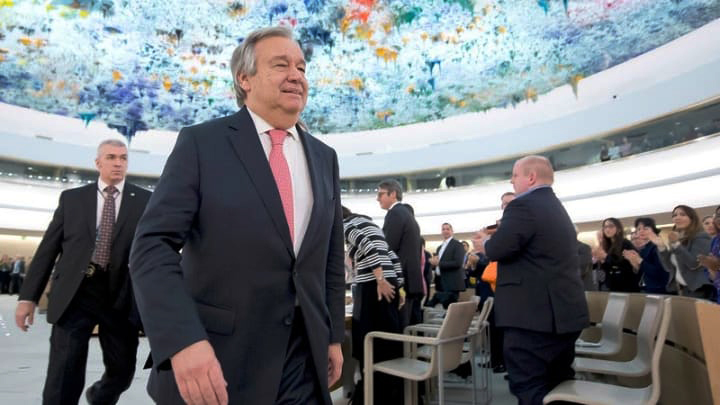NEW YORK (TIP): After months of speculation, United Nations chief António Guterres officially announced his bid for reelection this week through his spokesperson’s office.
The race might be a relatively straightforward and possibly short one; so far, no other candidates have stepped forward. And Guterres’ good standing with all five permanent members of the U.N. Security Council might discourage potential competitors, according to U.N. expert Richard Gowan. The Security Council holds the final vote to select the U.N. leader, and candidates require their government’s endorsement.
“It is fundamentally different from the last race in 2016, and I think the working assumption around the U.N. is that Guterres will win a second term without too much struggle,” Gowan said. “He gets a lot of credit from diplomats here for navigating the [U.S. President Donald] Trump era pretty well, overall, and the general idea is that if he wants a second term, which he clearly does, then he should have a chance to stay on.”
Guterres unofficially laid out a vision for a second term in July, when he called for a new social contract to better address “two seismic shifts” that will shape this century: the climate crisis and digital transformation. “Both could widen inequalities even further,” Guterres said in the speech. The COVID-19 pandemic, meanwhile, has presented a once-in-a-lifetime opportunity to “build back a more equal and sustainable world,” he said.
From aviation to trade to industrial development, a number of top jobs at the United Nations are up for grabs this year. A second five-year term for Guterres would give him the chance to build on these efforts, which, in some cases, have suffered political blows. The U.S., one of the world’s largest greenhouse gas emitters, is likely to rejoin the Paris climate agreement under President-elect Joe Biden’s administration, among other expected reversals from Trump administration policies.
“When I read that [2020 speech], I felt confident Guterres assumed that if Biden won, he would run again. In a sense, that speech was his stump speech, and he was already laying out what this campaign is all about and a level of ambition that is much greater than would have been feasible in the last four years,” Gowan said.
The presidents of the General Assembly and Security Council are expected to soon release a letter that would formally initiate the selection process for the next secretary-general. Officially opening up the election process, as the General Assembly last did in 2015, to include more candidates will be an important step, even if they do not immediately appear, according to Enyseh Teimory, communications officer at the United Nations Association – UK. Setting a deadline for nominations, likely in the early spring, will also be part of this process.
“I don’t know if there will be other candidates coming forward, and so far, Guterres hasn’t done much to rock the boat.”
— Mandeep Tiwana, chief programs officer, CIVICUS
“We have not had anything specific from anybody, but we hope that someone somewhere will step forward, kind of just in terms of having an open and transparent process,” Teimory said.
“I think they [the president of the General Assembly and Guterres] have demonstrated in the language a commitment to opening up the process and to receiving potential multiple nominations,” Teimory continued.
Russia or China proposing another candidate would potentially change the election forecast, but so far there is no clear indication of this, according to Mandeep Tiwana, chief programs officer at civil society coalition CIVICUS.
“The incumbent usually has such an advantage. I don’t know if there will be other candidates coming forward, and so far, Guterres hasn’t done much to rock the boat,” Tiwana said.
Civil society organizations such as UNA-UK and CIVICUS have voiced concerns about the election process remaining transparent. In 2016, Guterres initially ran against 12 other candidates, but the number of competitors was eventually whittled down to four finalists, including Helen Clark, then-head of the U.N. Development Programme and former prime minister of New Zealand.
That election marked the first time that the race for secretary-general included public debates and speeches, instead of centering solely on closed-door political appeals and negotiations. The 1 for 7 Billion civil society campaign — a group of NGOs that convened for a transparent secretary-general election process — pushed for a woman to be selected as U.N. chief for the first time.
While Guterres was selected for secretary-general in October 2016, predecessors were confirmed for a second term earlier in the year. For example, Ban Ki-moon was reselected for secretary-general in June 2011.
“I think if it becomes clear that there isn’t an alternative candidate, then quite frankly the bulk of the Security Council members and the bulk of the General Assembly members would probably want it out of the way, and they might want it out of the way before the GA in September,” Gowan said.
Going through the motions of a traditional campaign would still set an important precedent for future campaigns and would also lend credibility to Guterres’ reelection bid.
“At the end of the day, the key for us is [that] the process is consolidated. It lends to legitimacy for whoever the SG is or continues to be. That legitimacy is fundamental at this time while they are leading and international organizations like the U.N. face such challenging times,” Teimory said.
